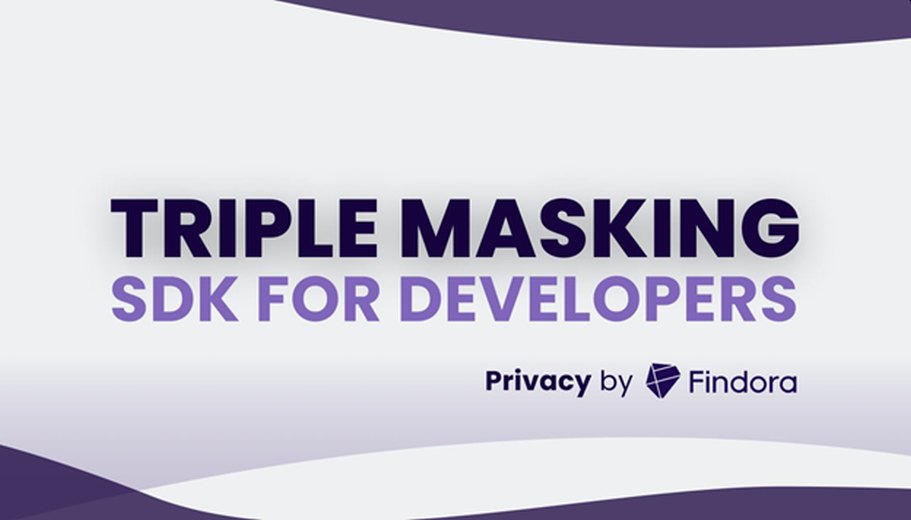Findora launches triple masking ZK SDK, a simple plug-and-play privacy & auditability for Dapps

Findora, a decentralized financial network designed to enable secure and confidential financial transactions, today announced the launch of the Findora Triple Masking SDK, a universal privacy-preserving solution set for Web3.
The Findora Triple Masking SDK offers developers an easy means of integrating zero-knowledge proofs into their decentralized applications, enabling users to conduct confidential transactions that remain verifiable, with various options for data masking or transparency. This provides a straightforward and customizable privacy solution for every Web3 dApp.
While blockchain technology solved a fundamental challenge for digital assets by addressing the issue of replication and double-spending. However, this solution relied on transparency, meaning that every movement of a digital asset was visible on a decentralized accounting system. While this eliminated the need for a third-party record keeper, it also prevented industries and institutions with legal obligations to protect personal identifying information (such as health records) from utilizing this new technology.
For the last five decades, financial institutions have been obligated by regulation to safeguard privacy. Consumers have the right to maintain confidentiality of their personal financial information from the public. Regulations pertaining to these institutions emphasize the importance of obtaining the customer’s consent prior to any disclosure of personal identifying details, including account balances, product purchases, etc. Privacy is rightfully acknowledged as the users’ exclusive ability to control and authorize access to their data.
Zero-Knowledge proofs are a cryptographic technique that enables blockchains to conceal transaction data while still allowing the information within them to be validated. This solution, while computationally complex, allows a blockchain to verify that a certain digital asset has been moved without requiring information about the sender, receiver, and the asset itself. In other words, they are the missing ingredient that can both provide private transactions of digital assets while assuring that those assets are only spent once.
“Triple Masking fulfills a promise that blockchain technology made years ago: your financial status, your financial future, is no longer in the hands of some unknown, so-called “trusted” third party. It’s in your hands,” said Sam Harrison, CEO, Discreet Labs. “This SDK simplifies the developer experience of implementing complicated zk-proofs, which in turn enables more decentralized applications to offer the benefits of these zk-proofs to their users.”
Harrison added: “Users tend to have to make a choice between privacy and convenience. And when they do, they usually pick convenience. I am excited to see what choices developers can offer their users when privacy and convenience are both attainable.”
The Findora Triple Masking SDK is a privacy-focused asset transfer solution supported on the Findora Network that provides full-privacy protection and anonymity for transactions rather than simple pseudonymity. The SDK allows every developer to make their dApps ZK-enabled, with optional transaction privacy at three levels. Because it’s configurable, users have the choice to mask the wallet addresses of both the sender and the receiver, the type of asset involved, and the amount sent. At the same time, transactions will remain auditable to ensure compliance with regulatory bodies. Findora Triple Masking SDK integrates asset tracing capabilities that allow every transaction to be monitored by auditors, while obscuring them from prying eyes on the public blockchain.
“Triple Masking is more than simply encrypting information. We are also offering the ability to trace assets in a way that complies with existing regulations and analysis tools. This way, Triple Masking solves both the privacy AND compliance requirements of a professional institution,” Harrison added.
Findora Triple Masking is built on application-specific turbo-plonk ZK-circuits and it’s significantly faster than the industry benchmark, with the ability to scale to thousands of transactions per second.
By incorporating interoperability with the prominent elliptic curve signing algorithms, including ed25519 and secp256k1, developers can implement masking services for transactions between EVM standard wallets and more private architectures, such as bitcoin’s UTXO format. Furthermore, using Findora’s Prism++ transfer mechanism, developers can conveniently apply these privacy-preserving characteristics to any asset class, such as FRC20, FRC721, or FRC1155. With this user-friendly software development kit, Findora is positioned to serve as the universal privacy layer for all Web3.
“Findora Triple Masking uses application-specific turbo-plonks, a type of zero-knowledge succinct non-interactive argument of knowledge, also known as a zk-Snark. This solution creates an anonymous blind asset record (an “ABAR”) that enables asset transfers to be encrypted as a cryptographic commitment rather than storing transaction data in plaintext like they do on other public ledgers,” said Weikeng Chen, Chief Scientist, Discreet Labs. He went on, “This is similar to the way zcash stores their cryptographic commitments. For most EVM chains, however, the transaction data is stored as plaintext and is therefore open to public scrutiny.”
Findora’s compatibility with the secp256k1 curve will enable common EVM wallets such as MetaMask to sign a transaction. “While MetaMask may not be able to enable private transactions directly,” Harrison said, “the private transactions can be signed by MetaMask and handled by the applications directly.”
Harrison continued, “This is a very significant achievement. The release of this SDK is the culmination of the original design of the founders of Findora. A solution set that provides a user with the choice to retain confidentiality while at the same time providing a mechanism that supports regulatory compliance regarding asset tracing and other applicable laws. It isn’t an exaggeration to say that this solution is what the blockchain industry has been waiting for.
Originally conceptualized as a university cryptography research project in 2017, and finally launched to the public in 2021, Findora is a public blockchain with programmable privacy. Findora also leverages the latest breakthroughs in zero-knowledge proofs and multi-party computation, to allow users transactional privacy with selective auditability.

